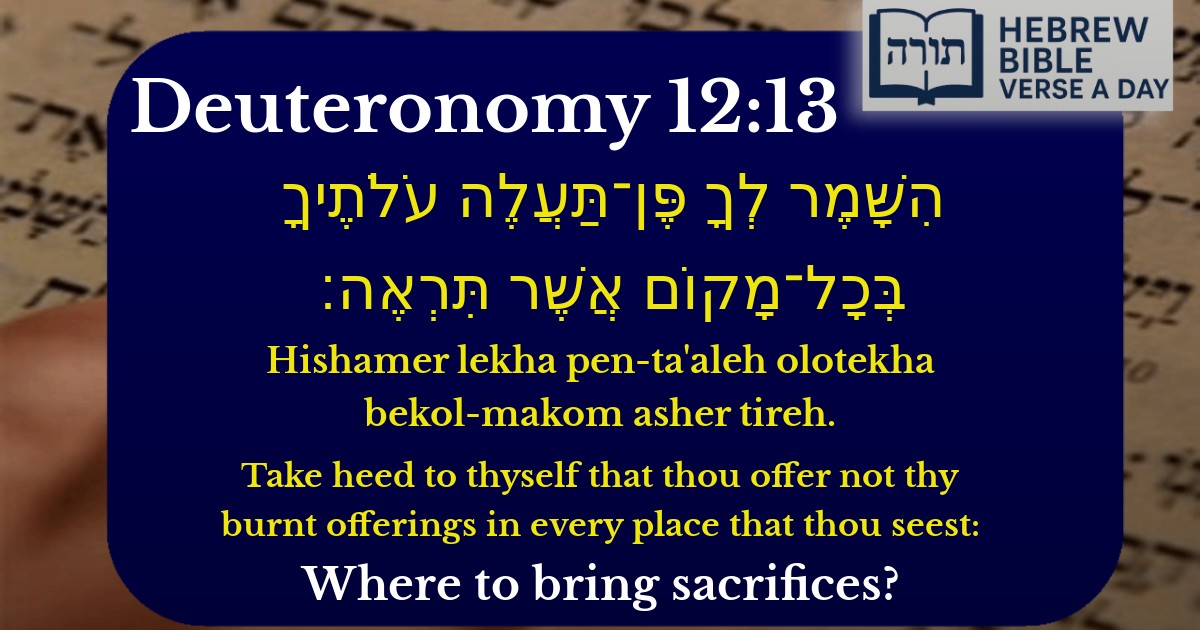Join Our Newsletter To Be Informed When New Videos Are Posted
Join the thousands of fellow Studends who rely on our videos to learn how to read the bible in Hebrew for free!
Hebrew Text
הִשָּׁמֶר לְךָ פֶּן־תַּעֲלֶה עֹלֹתֶיךָ בְּכָל־מָקוֹם אֲשֶׁר תִּרְאֶה׃
English Translation
Take heed to thyself that thou offer not thy burnt offerings in every place that thou seest:
Transliteration
Hishamer lekha pen-ta'aleh olotekha bekol-makom asher tireh.
Hebrew Leining Text
הִשָּׁ֣מֶר לְךָ֔ פֶּֽן־תַּעֲלֶ֖ה עֹלֹתֶ֑יךָ בְּכׇל־מָק֖וֹם אֲשֶׁ֥ר תִּרְאֶֽה׃
הִשָּׁ֣מֶר לְךָ֔ פֶּֽן־תַּעֲלֶ֖ה עֹלֹתֶ֑יךָ בְּכׇל־מָק֖וֹם אֲשֶׁ֥ר תִּרְאֶֽה׃
🎵 Listen to leining
Parasha Commentary
📚 Talmud Citations
This verse is quoted in the Talmud.
📖 Zevachim 106b
The verse is discussed in the context of the prohibition against offering sacrifices outside the designated place (the Temple in Jerusalem). The Talmud explores the implications of this commandment and its relevance to the laws of sacrifices.
📖 Chullin 17a
The verse is referenced in a discussion about the proper places for slaughtering and offering sacrifices, emphasizing the restriction to specific locations as commanded in the Torah.


Context and Source
The verse (Devarim 12:13) appears in Parashat Re'eh, where Moshe instructs Bnei Yisrael regarding the proper worship of Hashem upon entering Eretz Yisrael. This commandment establishes the prohibition against offering sacrifices outside the designated place—eventually the Beit HaMikdash in Yerushalayim.
Rashi's Explanation
Rashi (Devarim 12:13) clarifies that this verse prohibits offering korbanot (sacrifices) on private altars (bamot) once the Mishkan or Beit HaMikdash is established. He emphasizes that this is a safeguard against idolatrous practices, as offering sacrifices in unauthorized locations could lead to improper worship.
Rambam's Perspective
In Mishneh Torah (Hilchot Beit HaBechira 1:2), the Rambam codifies this prohibition, stating that after the selection of Yerushalayim as the permanent site for the Beit HaMikdash, all sacrifices must be brought there exclusively. He derives this from the broader context of the Torah's emphasis on centralized worship.
Talmudic and Midrashic Insights
Halachic Implications
The prohibition underscores the principle of kedushat makom (sanctity of place) in avodat Hashem. The Beit HaMikdash is the exclusive conduit for korbanot, ensuring unity in worship and preventing fragmentation of religious practice. This law remained in effect until the destruction of the Second Temple and will be reinstated with the rebuilding of the Third Temple, may it be speedily in our days.